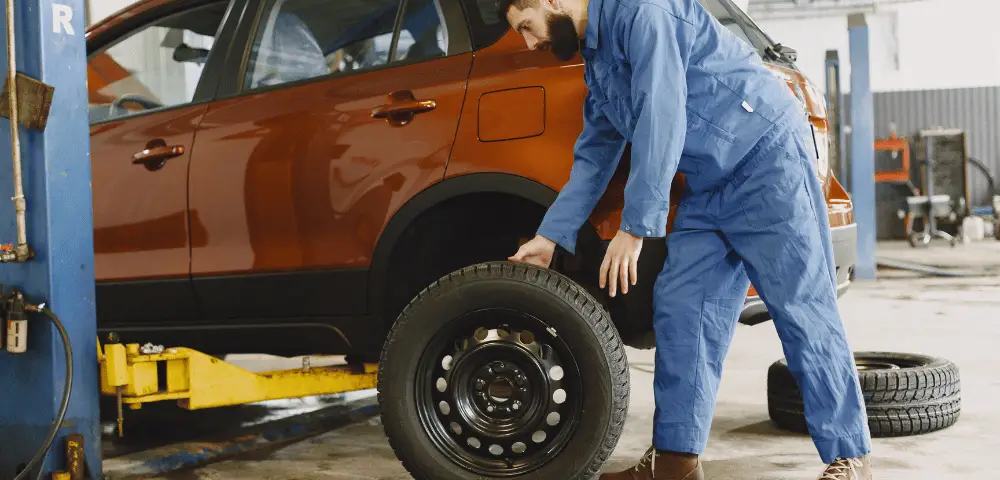Every vehicle owner eventually faces several tire problems.
All tires eventually need to be replaced. Depending on what problem you’re facing, some tires need to be changed earlier than others.
However, should you replace all your tires? Or should you replace just one? Here’s what you need to know.
Should All Four Tires Be The Same?
In an ideal scenario, all four tires of your vehicle need to be the same for the optimal performance of your vehicle.
Be it handling, traction, or vehicle stability, the same tires help you avoid general issues related to the stability of your vehicle.
They also allow your tires to undergo equal wear and tear.
Purchasing all four tires of the same size, brand, model and even tread pattern allows your tires to deliver consistent performance throughout their life.
They’ll have a similar grip level and traction that will deliver a comfortable and controlled driving experience.
Mismatched tires can create far too many problems for you.
The most significant issue is that your tires undergo uneven wear. It would be difficult for you to drive and control the movement of the vehicle as you’ll be pushed towards one side or the other.
The situation becomes even more problematic if you drive mismatched tires in extreme weather conditions such as rain, snow, and more.
Moreover, the type of tires that you use needs to be suitable for the driving conditions that you usually encounter.
If you frequently drive off-the-road, your tires need to be capable of withstanding the different kinds of elements that you might encounter.
You also need to use different types of tires for driving in the rain, on the highway, or through the snow.
Is It Okay To Replace All Tires At Once?
Replacing all tires simultaneously is the recommendation given to most vehicle owners.
That’s because replacing all four wheels allows you to enjoy consistent handling, traction, and stability.
Four wheels of the same size, brand, and model also allow the driver to have better control over their car.
You should remember that all 4 tires spin independently of one another.
If these tires have different tread patterns and sizes, the wheels will end up spinning at different speeds.
Can You Always Replace One Tire?
The short answer is ‘Yes’. You can replace a single tire if needed. However, it’s always recommended to replace them together.
So, why do most vehicle owners avoid replacing all four tires? Because new tires are extremely expensive. They can take a huge toll on your wallet.
It’s important to remember that the new tire should be of the same brand and model as the rest.
You will also experience a somewhat different and difficult driving experience.
That’s because one tire would have better grip and traction compared to the rest, causing your vehicle to become slightly unbalanced.
Is It Ok To Replace Only 2 Tires?
Similarly, it’s okay for you to replace two tires instead of all four.
Depending on the severity of the damage on your tires, you might actually be forced to replace two tires instead of one.
You should be mindful that your new wheels have the same size and tread pattern when compared with the existing tires on your vehicle.
Besides this, you’ll also have to consider replacing two tires on the same axle.
This helps maintain the balance of the vehicle and allows you to handle and control it easily.
For instance, it’s recommended to replace the front tires if you have front-wheel drive.
That’s because front wheels play a significant role when it comes to the handling and stability of the vehicle.
It’s essential to consider these factors so that your vehicle can deliver optimal performance.
Is It Ok To Replace Only 3 Tires?
You might be surprised but generally, replacing three tires is not recommended.
Doing so will undoubtedly lead to several handling and stability issues.
That’s because vehicles with 3 new wheels usually end up causing the vehicle to become extremely unbalanced.
You’ll find yourself struggling to control your car, especially if you’re driving at a high speed.
Changing only three wheels also becomes dangerous as you might struggle to control the vehicle during an emergency.
That’s not all.
Replacing three wheels leads to additional stress on the existing tire.
Basically, your tires work simultaneously to provide a comfortable and safe driving experience.
If one wheel is noticeably smaller or worn out compared to the rest, you’ll end up putting stress on your car and this will detrimentally impact your vehicle’s performance.
What Can You Do To Reduce Stress On Your Wheels?
One easy method of reducing stress on your tires is by having your car get a tire rotation regularly.
Regular rotation lets you equalize the wear across all the tires.
You might be wondering how tire rotation can make a difference.
The answer is pretty simple. Depending on your vehicle and the position of your tires, some wheels have more contact with the road compared to others.
This means that these tires end up bearing the brunt of stress as you drive.
Regular rotation ensures that this stress gets evenly spread out to the rest of the tires as well.
How Much Is Too Much For 4 New Tires?
If you’re getting new tires, you should be ready to make a hefty investment.
Still, the cost of new tires mostly depends on several different factors such as the type of vehicle you have, tire type, tire brand, tire size, model, and more.
In any case, you can expect the price to fall within a range of $400 to $1,500 at max.
It’s important to understand that the type of tire you get for your vehicle mostly determines the cost that you’ll incur.
For example, high-performance and luxury vehicles require expensive tires.
Similarly, all-season tires vs off-the-road tires also have different prices.
Should I Just Invest In Cheap Tires?
You might be tempted to avoid expensive bills by buying cheap tires.
However, it’s always important to note that the cost of tires is just a single component of the car that requires attention.
High-quality tires are usually built to last, can optimize the performance of your car, and save money down the line.
How Can I Buy Good Tires For My Vehicle?
It’s easy to get overwhelmed if you don’t know what you’re doing.
The best approach usually relies on comparing the prices of tires and features offered by direct manufacturers.
Before that, however, you need to choose the right tire type.
It’s best to consult your vehicle’s manual and to determine the minimum requirements.
While making your choice, you should also consider other factors such as weather, the surface where you drive, and tire life expectations.
Once you’ve selected the tire type, you can look at different shops to find the tire that fits your needs.
Try to take a look at online reviews of the tire before you make any commitments.
You should also consider the tire manufacturer as several manufacturers offer warranties and guarantees that you can avail.
Conclusion
It’s always recommended to replace all four of your tires.
However, you can replace one or two tires only. Your new wheels must have the same size and tread pattern.
That way, you can avoid an uncomfortable driving experience.


